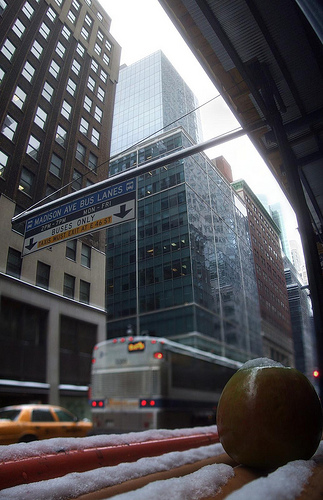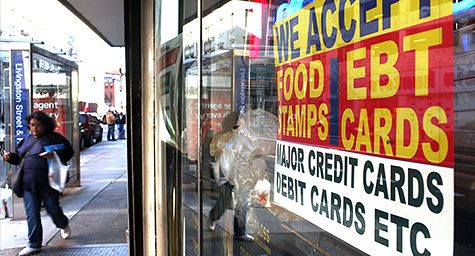Food Security vs. National Security
 Hilzoy wonders why we take counterterrorism more seriously than food inspection.
Hilzoy wonders why we take counterterrorism more seriously than food inspection.
After all, food-borne illness kills about 2,000 more people every year than died on 9/11; why we should spend over half a trillion dollars a year defending ourselves against human invaders while leaving ourselves open to bacteria that are every bit as lethal is a mystery that passeth all understanding.
Oh, c’mon. We’re comparing apples and skyscrapers here.
The 9/11 attacks happened in three locations — the Twin Towers, the Pentagon, and a passenger jet over the skies of western Pennsylvania — within the one a single day. They were a deliberate act of murder that only government could have conceivably prevented.
Meanwhile, there are 306-odd million Americans spread over a giant continent. Each of them eats 365 days a year, usually more than once. Further, the lion’s share of the cases of serious food poisoning could have been prevented by individuals with better sanitary procedures, proper food storage, or more thorough cooking.
I’ve got no real opinion on the Waxman-Dingell bill that Hilzoy points to as “one of those dull bills that really matters.” According to Lyndsey Layton‘s story in WaPo, it
would give the Food and Drug Administration broad new enforcement tools, including the authority to recall tainted food, the ability to “quarantine” suspect food, and the power to impose civil penalties and increased criminal sanctions on violators.
Among other things, the proposal would put greater responsibility on growers, manufacturers and food handlers by requiring them to identify contamination risks, document the steps they take to prevent them and provide those records to federal regulators. The legislation also would allow the FDA to require private laboratories used by food manufacturers to report the detection of pathogens in food products directly to the government.
Offhand, it sounds like a good idea. But there’s no such thing as “e. coli conservatism.” While there are a handful of anarco capitalists out there, even those of us who prefer our government small recognize the need for the FDA and USDA in a globalized world. The fact of the matter, though, is that, while it may well make sense to increase the number of food inspectors and the like, we’re simply not going to be able to inspect every batch of food that goes out to consumers. Our country is just too vast and our food supply too differentiated for that. Could, say, tripling the number of inspectors have prevented a few deaths from, say, contaminated peanut butter or unwashed spinach? Maybe. Maybe not.
Then again, the same thing is true of terrorist attacks, too. We can throw tens of billions at killing bad guys and trying to improve the lives of people in the countries likely to breed future terrorists but, as Jim Jones noted earlier this week, “perfection is an impossible standard” in the national security business.
I could, therefore, pretty easily be convinced that shifting a few billion dollars from homeland security to food safety makes sense. But let’s talk about logistics rather than intentions.
Photo by Flickr user Chu under Creative Commons license.






After reading this, and that the government’s auto taskforce believes non-compliant lenders are terrorists, I think some are losing sight quickly of what “terrorism” is. Hint: the idea of terror is involved.
Well-intentioned but completely inadequate, I’m afraid. Consider the pet food contamination case from a few years ago. Any reasonable reading of what happened is that there was systematic adulteration of a food ingredient, wheat gluten, with an industrial chemical, melamine, in what can only be construed as a deliberate attempt to make an inferior product appear to the most likely test (a simple test for nitrogen) to be better than it was. How does a manufacturer assess the risk of that?
If the product had been bought from a domestic supplier we have an entire system of civil and criminal jurisprudence to deal with the situation. It’s a risk management system. There is no comparable global infrastructure.
The legislation appears to push the problem a step or two upstream, creating a bureaucratic thicket along the way. Will that resolve the problem? Or will it just document it?
Note, too, the offloading of responsibility from federal bureaucrats onto American businesses. The federal government has a primary responsibility to control things imported into the country and jealously guards that power against infringement from state and local governments. The Department of Agriculture has a primary responsibility to ensure the wholesomeness of the food supply. This appears to withdraw responsibility from points of origin and place it in Washington.
What is needed is either a) restrictions on importation or b) a lot more inspectors. This bill doesn’t seem to accomplish either of those things.
This seems like something that would be straightforward to run as a cost-benefit analysis. I don’t see it as an abstract (or non-numeric) argument.
I don’t have the expertise in the subject for numbers but presume that there is a way of doing cost-benefit analysis. Here, I’m just noting that it’s not simply a matter of caring about one threat while ignoring another.
Agreed. What we are probably looking at here are the emotional reactions we have to visualized threats. From what I’ve read, our outlook depends a lot on how easily visualized and nasty a death would be. We worry more about auto safety and less about heart attack (the classic example).
Whether terrorists or e. coli, one could do some fuzzy math and get pretty close on dollars spent and lives/property saved. The rough thing is that you have to use the “value of a statistical life” for these things, which puts quite a few people off. No matter though, because it is really a place-holder for Plan A versus Plan B.
I suspect that we may enter into a “jobs created or saved” sort of unprovability at least in part because there’s no straight-line relationship between the means and the end. How efficient are the means we’re using to prevent lives being lost due to terrorist attack? How efficient are the means we’re using to prevent lives being lost due to food contamination?
My guess is that neither is particularly efficient. You can measure the inputs and you can measure the outputs; the relation between the inputs and outputs may be hypothetical.
I think there’s another point that’s in danger of being lost in this discussion. The federal government has different degrees of responsibility for different activities. Its highest responsibility is defending against foreign attack (whether by nations, NGO’s, or individuals) because it has an exclusive monopoly on the activity. States, counties, cities, etc. can do food inspection and monitoring.
I agree again. The “big panic” items probably fail even fuzzy cost-benefit analysis.
(Note that some environmental issues which don’t get “panic” traction, say the state of ocean fisheries, have “long tail” risks deep to the downside. We don’t worry because what’s beneath the waves is very much out of sight and out of mind.)
We also need to give some thought to the transportation infrastructure that we rely on for food. If interstate trucking were to break down, how long would it be before people were being killed over food?
Dave, the problem with your example is that it’s intentional contamination of the food. That’s really an easier situation to justify action, because presumably the contamination will continue indefinitely unless stopped. Also, it’s easier to identify the cause though minimal sampling. The occassional, confluence of events, contamination is both harder to predict and harder to evaluate a sampling criteria that won’t simply be wasteful.
General note: Hilzoy’s link indicates that severe food illnesses tend to inflict the very old, the very young, those with pre-existing health issues, and those who consume abnormal amounts. Food safety is a subjective concept.
While technically true, I think it misses the point. When determining priorities you always have to rank things that are not directly comparable. That said if the sum total of Americans killed by terrorism in our entire history, world wide, is less than 20,000 (and it is) and we have ~40,000 Americans killed in auto accidents EVERY year then it becomes pretty obvious that spending a trillion dollars on counter terrorism is just irrational. The problem, while blatant, is actually very minor.
Does that mean we should ZBB all counter terrorism? No, there are certainly counter terrorism efforts that are worth while. But Terrorism has been the very top priority of our government for 8 flippin years!
Obviously the problem does not warrant the efforts taken in response.
I’d really like to believe that. Unfortunately I think that the weight of evidence shows that there are strong contingents of the GOP that are very happy to undercut any and all regulatory bodies. It’s really just not a coincidence that we had a bunch of mine accidents, a bunch of food poisoning, and so on after electing people who openly disdain any efforts to regulate “free” markets.
And, sad to say, this is one area where the wingnut right’s worst impulses are not ameliorated by an influx of libertarian thought. The opposite unfortunately.
No, not at all. Now, I think we’re likely over-spending on CT and that much of our CT money is likely being misspent. But it doesn’t follow from the above.
Death from accident doing things that everybody does everyday is simply not the same as being murdered. Indeed, we have more deaths from car accidents each year than ordinary criminal murders, too. But we consider the former an acceptable risk of living and the latter unacceptable.
We tend to take prudent countermeasures like better vehicle and road engineering that can be mostly outsourced to individuals and companies as well as providing some speed limit and other law enforcement aimed at road safety. For murders, we spend inordinate resources trying to stop the largely unstoppable. But we feel as a society that we have to try because murder is heinous and intentional while car accidents are tragic happenstance.
Is it rational to spend so much for security for one man, the President?
Was it rational (in hindsight) for Lincoln to go to war over the one fatality at Fort Sumter, which eventually resulted in one million dead or wounded Americans and the freeing of four million slaves?
My view is that there injuries to the state which are distinct from injuries to the person that the state has a special responsibility to address. Unless you want to live in a dystopian novel of complete statist control of all facets of life, the state has no responsibility to keep individuals safe from all risks of harm.
That’s the part that is irrational. Just because we have gotten into the mindset doesn’t mean it makes any sense. Sometimes you have to take a step back from the preconceptions and go “WTH?”
A person dead in a car accident is just as dead as one in a terrorist attack. They still died of a preventable event and not from say old age. That being the case where is the big difference, other than that in terrorism we get the feel good aspect of having someone to blame and in the auto accident we may not…
Clearly those countermeasures need to be revisited, and badly. Put it this way: a 1% improvement in auto deaths would have saved us the same number of people as a 100% improvement in domestic terrorism deaths during the course of the Bush years.
Again this is the part that is irrational if you stop and look at objectively. There’s no reason to spend so excessively more effort on a minuscule cause of harm. Effort should be proportional to the harm modified by the efficiency of the effort (in other words if we can make a big difference in a small harm with a slightly disproportionate effort then that’s probably worthwhile).
Do we actually try to “stop” murders? Not really until they are in the offing (attempted or when someone makes direct threats).
Doesn’t the war on drugs count?
Our justice system is targeted on avenging crime, not preventing it.
I agree with the bulk of what you say, that this is irrational, etc.
But I’m afraid it isn’t mindset or preconception … I’m afraid it is brain structure and human nature. It falls in with “bad things easily visualized.”
Some of the new measures (quarantining suspect food, the power to impose civil penalties and increased criminal sanctions on violators, and possibly more self reporting) seem ok.
I thought that they already had the authority to recall tainted food. Are all the recalls we have seen voluntary? If so it seems the current mechanism works well enough.
As PD pointed out this is going disproportionately to strike those with the weakest immune systems. This is and will remain true for virtually all health scares.
That said some restrictions should be rolled back. Small local vegetable and fish markets should have their regulatory burden lowered. Our local fish auction in Hilo was closed down for failure to adequately report where each fish sold came from. This is not such a great burden if you are hauling in tons of fish at a go, but if you are selling the catch of hundreds of small time local fishermen coming in with catches of at most a couple dozen it is impossible to stay in business. Maybe require signs to be posted warning consumers that the fish, vegetables, or whatever have not been inspected would suffice. As it is those sales have moved to the backs of peoples trucks on the side of the road.
That’s certainly possible, we are still ensnared by a host of genetic legacies. Still even in those cases, if we recognize them, we can try to mitigate their ability to sway us.
That’s certainly possible, we are still ensnared by a host of genetic legacies. Still even in those cases, if we recognize them, we can try to mitigate their ability to sway us.
This is very true. It’s also why we have consumer protection laws and strict product liability for those involved in the stream of commerce, whether in food products or other products. But unfortunately, there are some conservatives and libertarians out there that are fundamentally opposed to these legal protections.